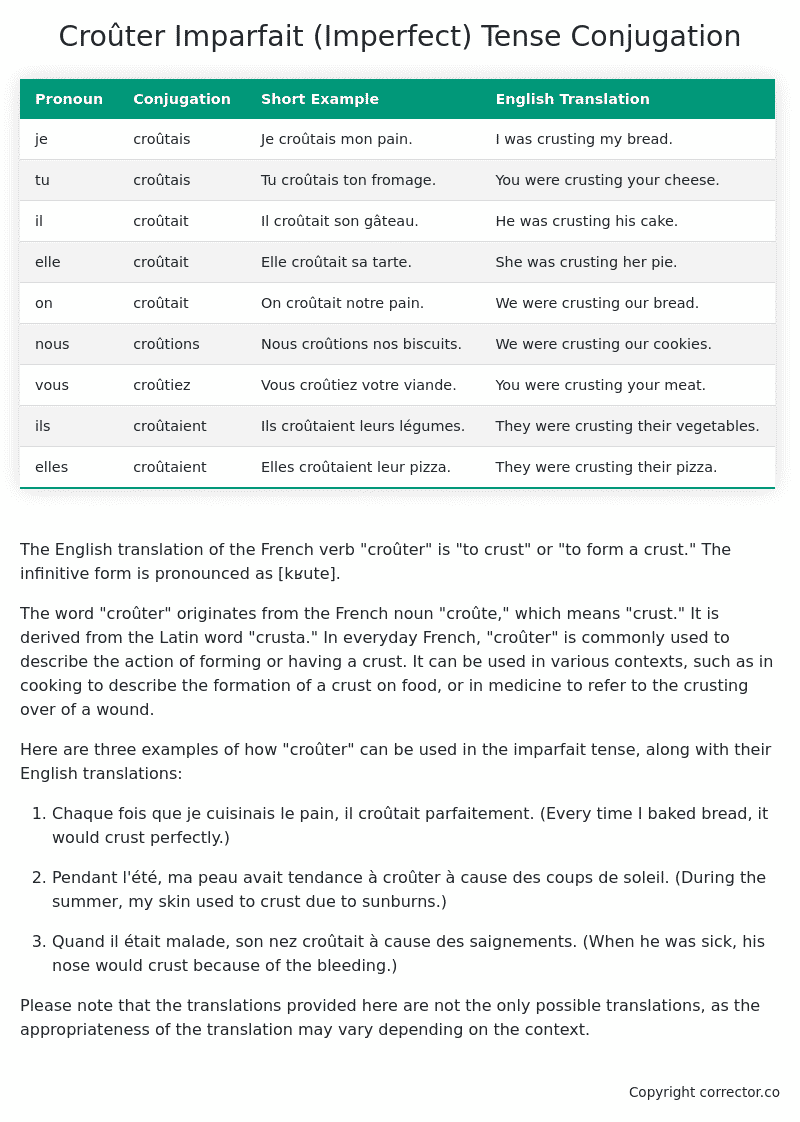Imparfait (Imperfect) Tense Conjugation of the French Verb croûter
Introduction to the verb croûter
The English translation of the French verb “croûter” is “to crust” or “to form a crust.” The infinitive form is pronounced as [kʁute].
The word “croûter” originates from the French noun “croûte,” which means “crust.” It is derived from the Latin word “crusta.” In everyday French, “croûter” is commonly used to describe the action of forming or having a crust. It can be used in various contexts, such as in cooking to describe the formation of a crust on food, or in medicine to refer to the crusting over of a wound.
Here are three examples of how “croûter” can be used in the imparfait tense, along with their English translations:
-
Chaque fois que je cuisinais le pain, il croûtait parfaitement.
(Every time I baked bread, it would crust perfectly.) -
Pendant l’été, ma peau avait tendance à croûter à cause des coups de soleil.
(During the summer, my skin used to crust due to sunburns.) -
Quand il était malade, son nez croûtait à cause des saignements.
(When he was sick, his nose would crust because of the bleeding.)
Please note that the translations provided here are not the only possible translations, as the appropriateness of the translation may vary depending on the context.
Table of the Imparfait (Imperfect) Tense Conjugation of croûter
| Pronoun | Conjugation | Short Example | English Translation |
|---|---|---|---|
| je | croûtais | Je croûtais mon pain. | I was crusting my bread. |
| tu | croûtais | Tu croûtais ton fromage. | You were crusting your cheese. |
| il | croûtait | Il croûtait son gâteau. | He was crusting his cake. |
| elle | croûtait | Elle croûtait sa tarte. | She was crusting her pie. |
| on | croûtait | On croûtait notre pain. | We were crusting our bread. |
| nous | croûtions | Nous croûtions nos biscuits. | We were crusting our cookies. |
| vous | croûtiez | Vous croûtiez votre viande. | You were crusting your meat. |
| ils | croûtaient | Ils croûtaient leurs légumes. | They were crusting their vegetables. |
| elles | croûtaient | Elles croûtaient leur pizza. | They were crusting their pizza. |
Other Conjugations for Croûter.
Le Present (Present Tense) Conjugation of the French Verb croûter
Imparfait (Imperfect) Tense Conjugation of the French Verb croûter (You’re reading it right now!)
Passé Simple (Simple Past) Tense Conjugation of the French Verb croûter
Passé Composé (Present Perfect) Tense Conjugation of the French Verb croûter
Futur Simple (Simple Future) Tense Conjugation of the French Verb croûter
Futur Proche (Near Future) Tense Conjugation of the French Verb croûter
Plus-que-parfait (Pluperfect) Tense Conjugation of the French Verb croûter
Passé Antérieur (Past Anterior) Tense Conjugation of the French Verb croûter
Futur Antérieur (Future Anterior) Tense Conjugation of the French Verb croûter
Subjonctif Présent (Subjunctive Present) Tense Conjugation of the French Verb croûter
Subjonctif Passé (Subjunctive Past) Tense Conjugation of the French Verb croûter
Subjonctif Imparfait (Subjunctive Imperfect) Tense Conjugation of the French Verb croûter
Subjonctif Plus-que-parfait (Subjunctive Pluperfect) Tense Conjugation of the French Verb croûter
Conditionnel Présent (Conditional Present) Tense Conjugation of the French Verb croûter
Conditionnel Passé (Conditional Past) Tense Conjugation of the French Verb croûter
Conditionnel Passé II (Conditional Past II) Tense Conjugation of the French Verb croûter
L’impératif Présent (Imperative Present) Tense Conjugation of the French Verb croûter
L’impératif Passé (Imperative Past) Tense Conjugation of the French Verb croûter
L’infinitif Présent (Infinitive Present) Tense Conjugation of the French Verb croûter
L’infinitif Passé (Infinitive Past) Tense Conjugation of the French Verb croûter
Le Participe Présent (Present Participle) Tense Conjugation of the French Verb croûter
Le Participe Passé (Past Participle) Tense Conjugation of the French Verb croûter
Struggling with French verbs or the language in general? Why not use our free French Grammar Checker – no registration required!
Get a FREE Download Study Sheet of this Conjugation 🔥
Simply right click the image below, click “save image” and get your free reference for the croûter imparfait tense conjugation!

Croûter – About the French Imparfait Tense
NOTE: To take a deep dive into all the French tenses then see our article on Mastering French Tense Conjugation.
Formation of the Imparfait Tense
For regular -er verbs:
For regular -ir verbs
For regular -re verbs
Common Everyday Usage Patterns
Description of Past Habits
Background Information
Mental and Emotional States
It’s employed to express emotions, thoughts, or physical sensations in the past. For example: “J’étais content quand il est arrivé.” (I was happy when he arrived.)
Ongoing Actions
Points to Note About the Imparfait Tense
Passé Composé vs. Imparfait
Conditional
Si Clauses
Narration
I hope you enjoyed this article on the verb croûter. Still in a learning mood? Check out another TOTALLY random French verb imparfait conjugation!


